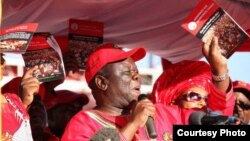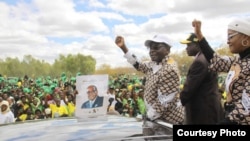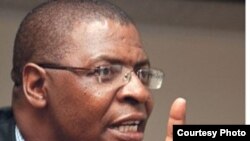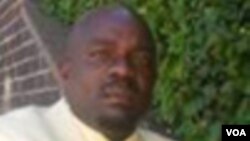WASHINGTON DC —
Zimbabweans head to the polls next Wednesday to elect a president with no current clear front runner though political commentators and some ordinary people believe that the race is between incumbent President Robert Mugabe and bitter rival, Prime Minister Morgan Tsvangirai.
Others have not yet ruled out Industry Minister Professor Welshman Ncube of the other faction of the Movement for Democratic Change.
Political commentators predict a tight race for Zimbabwe’s top most public position which has been occupied in the past 32 years by President Mugabe, a former freedom fighter.
Professor Shadreck Guto of the University of South Africa believes that President Mugabe has the upper hand over Mr. Tsvangirai, Ncube and other opponents though indications are that there may be no outright winner.
“It does seem that President Robert Mugabe’s Zanu PF party probably has the edge given that it controls the state machinery but also is able to use threats if not direct violence in some pockets of Zimbabwe,” says Guto.
He says Mr. Tsvangirai has not been able to keep his party together and this may have a devastating effect on his poll numbers.
“That plays in the hands of Zanu PF and I think because one of that one of the splinter groups is said to have joined another opposition party Zapu in Matabeleland and therefore this will reduce the number of votes for the party led by Tsvangirai,” says Guto.
Another political commentator, David Mogae, based in Johannesburg, South Africa, agrees, noting that results of the general election will be largely determined by ways in which the poll will be conducted.
“Elections in Zimbabwe have been largely characterized by violence and as such the presidential election results hinge on the electoral processes. And at this stage it is difficult to predict the outcome of the election,” says Mogae.
Effie Dlela Ncube, chairman of the National Association of Non-Governmental Organizations concurs, noting that no candidate will win by a clear majority.
But some Zimbabweans, who claim that they are not aligned to any party, believe that Prime Minister Tsvangirai will win the race while a few non-profit organizations have predicted a narrow win for Mr. Mugabe.
David Moyo of the Women in Leadership Development says Mr. Tsvangirai will be Zimbabwe’s next president.
“I strongly believe that Tsvangirai will win the elections judging by the large crowd that turned up for his rally in Bulawayo,” says Moyo.
Some Zimbabweans also say the presidential election outcome will be determined by contents of party manifestos, past political party records and bread and butter issues.
Bulawayo Agenda director, Thabani Nyoni, who is also the spokesman for Crisis in Zimbabwe Coalition, says people will vote on the basis of socio-economic issues which will improve their standard of living.
“Those turning out to vote will be looking for making a difference. If it’s (they are voting for) President Mugabe he will have to demonstrate that he will do something that he has not done I the past 32 years,” says Nyoni.
Indications are that political commentators and members of the public believe that Zapu chairman Dumiso Dabengwa and independent candidate Kisinoti Mukwazhe will not spring any surprises next week.
In the first round of the 2008 presidential election, Mr. Tsvangirai got almost 1,195 562 million votes compared to President Mugabe’s 1,079 730 million.
The prime minister did not have an outright majority to form the next government. He dropped out of the second round citing election violence.
Others have not yet ruled out Industry Minister Professor Welshman Ncube of the other faction of the Movement for Democratic Change.
Political commentators predict a tight race for Zimbabwe’s top most public position which has been occupied in the past 32 years by President Mugabe, a former freedom fighter.
Professor Shadreck Guto of the University of South Africa believes that President Mugabe has the upper hand over Mr. Tsvangirai, Ncube and other opponents though indications are that there may be no outright winner.
“It does seem that President Robert Mugabe’s Zanu PF party probably has the edge given that it controls the state machinery but also is able to use threats if not direct violence in some pockets of Zimbabwe,” says Guto.
He says Mr. Tsvangirai has not been able to keep his party together and this may have a devastating effect on his poll numbers.
“That plays in the hands of Zanu PF and I think because one of that one of the splinter groups is said to have joined another opposition party Zapu in Matabeleland and therefore this will reduce the number of votes for the party led by Tsvangirai,” says Guto.
Another political commentator, David Mogae, based in Johannesburg, South Africa, agrees, noting that results of the general election will be largely determined by ways in which the poll will be conducted.
“Elections in Zimbabwe have been largely characterized by violence and as such the presidential election results hinge on the electoral processes. And at this stage it is difficult to predict the outcome of the election,” says Mogae.
Effie Dlela Ncube, chairman of the National Association of Non-Governmental Organizations concurs, noting that no candidate will win by a clear majority.
But some Zimbabweans, who claim that they are not aligned to any party, believe that Prime Minister Tsvangirai will win the race while a few non-profit organizations have predicted a narrow win for Mr. Mugabe.
David Moyo of the Women in Leadership Development says Mr. Tsvangirai will be Zimbabwe’s next president.
“I strongly believe that Tsvangirai will win the elections judging by the large crowd that turned up for his rally in Bulawayo,” says Moyo.
Some Zimbabweans also say the presidential election outcome will be determined by contents of party manifestos, past political party records and bread and butter issues.
Bulawayo Agenda director, Thabani Nyoni, who is also the spokesman for Crisis in Zimbabwe Coalition, says people will vote on the basis of socio-economic issues which will improve their standard of living.
“Those turning out to vote will be looking for making a difference. If it’s (they are voting for) President Mugabe he will have to demonstrate that he will do something that he has not done I the past 32 years,” says Nyoni.
Indications are that political commentators and members of the public believe that Zapu chairman Dumiso Dabengwa and independent candidate Kisinoti Mukwazhe will not spring any surprises next week.
In the first round of the 2008 presidential election, Mr. Tsvangirai got almost 1,195 562 million votes compared to President Mugabe’s 1,079 730 million.
The prime minister did not have an outright majority to form the next government. He dropped out of the second round citing election violence.








